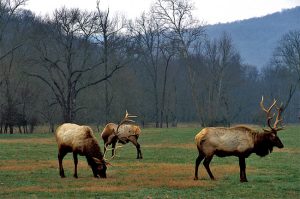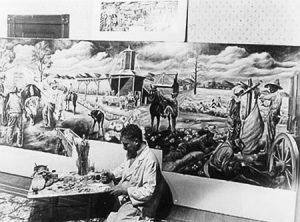calsfoundation@cals.org
A Postcard from Ponca

Three years ago, my wife and I spent a week that fall holed up in a cabin in Ponca, an unincorporated community in Newton County that is one of those rural places that thrives on outside visitors like us. Perched right near the Buffalo River, it is home to a handful of canoe and cabin rental services, the Ponca Bible Camp, and the Ponca Elk Education Center, a project of the Arkansas Game and Fish Commission to educate the public about the elk, once native to the area, that were reintroduced in the 1980s.
But Ponca was also home to something more amazing, something whose presence has often meant life for a community that might otherwise wither and die, something that has kept Americans connected with each other across the boundaries of geography and class. Namely, Ponca had a post office.

The building was a simple metal rectangle, and it ran limited hours. However, it was one of only a handful there in rural Newton County. Where I live in Little Rock, it is easy to take the presence of a post office for granted. I have one within walking distance of my house, and another within walking distance of my office, so it’s not hard at all to access the services I need or want. But up there in Newton County, a trip to the post office can be a drive of ten miles or more, but that’s still almost a luxury compared to some parts of the country, especially out in the American West.
Recently, Senator John Boozman filed a bill to make the Butterfield Overland Trail a National Historic Trail. Butterfield’s Overland Mail Company, as the CALS Encyclopedia of Arkansas notes, “was the longest stagecoach line in world history at approximately 2,812 miles and was a major factor in the settlement and development of Arkansas and the American West before the Civil War,” despite being in business for only three years. When the first Butterfield stagecoach entered Fort Smith in 1858, “its arrival was greeted with music, cheering, and cannon fire, which continued until the coach left for California.” Back then, communities celebrated the advent of mail services the way we might celebrate a Super Bowl win.
Longtime readers of the Encyclopedia of Arkansas may have noticed that one of our recent areas of growth has been those hundreds, thousands, of small towns, many now defunct, that have existed throughout the history of the state. Some of them no longer exist upon the landscape, their memories preserved only in the name of a cemetery or road, but many of them, at some point in their lives, had a post office. And with the advent of post offices, these communities would grow, adding schools and churches and stores. In fact, the post office was often the source of the local community, the kernel around which it was built. And when postal services were discontinued, it was often the death knell for what remained of the town.

During the Great Depression, the U.S. Treasury Department, as part of the New Deal, installed paintings or sculptures at post offices across the country “to remind Americans of their history at a time when the future looked uncertain and to glorify Americans’ work ethic.” Nineteen of these works of art can be found across Arkansas, many in buildings now listed on the National Register of Historic Places, reflecting the pride the people of the state felt in their homes and labors.
With the rise of e-mail and digital services that allow one to pay bills and perform other tasks online, the post office, for many, started to seem like a relic of bygone days. But then the emergence of e-commerce meant that we again became dependent upon the United States Postal Service for the delivery goods we had ordered online. In fact, among my family and friends are military veterans whose VA prescriptions are delivered through the mail. Our dependence upon regular mail delivery has only become greater during the current COVID-19 pandemic, as many people cannot risk venturing into public places.
That little post office in Ponca might be a luxury to those vacationing there and eager to send postcards to friends and family, but it is a vital service to those living in the mountains and valleys of Newton County, which remains one of the least populous counties in the state. The United States Postal Service, far from being a relic of our past, is the only lifeline to a future many of us have, and celebrations of its history will ring hollow unless we ensure its continued existence.
By Guy Lancaster, editor of the CALS Encyclopedia of Arkansas




